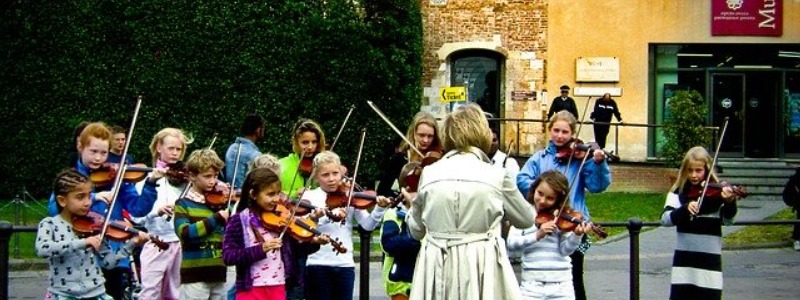If you’re looking into music lessons for your child, you’ll find a lot of options. You can take group lessons, private lessons, lessons online, or you can even throw some YouTube tutorials at them. All of these options have their merits and their drawbacks, but for now let’s look into group lessons versus private lessons.
Why Group Classes are Helpful
For most of your child’s life they will be learning in a group setting. Public schools typically teach in groups of around 20 students. This is the type of setting children are used to.
Group classes give the student opportunities to socialize and relate to students at their own age and level. Music classes at school are also given in a group setting. A lot of students will have their first exposure to music in these settings, and they can be very helpful in motivating a child to learn more.
Children are able to have fun with their friends while making music in these classes. It’s really an ideal situation isn’t it?
Often in public school classes, just the very basics are taught and the focus is more on making music than it is on learning it. These types of group classes are offered often in private tutoring institutions as well.
There’s no problem with that, but if a student wants to take it a step further, then private lessons are often needed.
Where Group Lessons Fall Short
The problem with a group setting is each student progresses at a different rate. This could be because the students have different levels of talent, but most often it’s because some children practice, but most just don’t. You may have noticed this in your child’s public school classroom. There are always some students that are behind and some that are ahead. It’s the job of the teacher to accommodate both types of students.
In music it becomes a little more difficult though. Music is not about just memorizing facts or understanding content. Music is a physical practiced skill. Students who haven’t worked on a specific skill can’t continue to learn something else.
When your child takes a group music class, perhaps the first lesson is very promising. All of the students start at the same place. It’s great. The teacher teaches the basics and everyone goes home to practice the material given by the teacher. Perhaps it’s a group of 10 students, and 2 go home and practice, but the other 8 just come back the next week without having practiced at all.
The teacher isn’t magical. The 8 students who did not practice did not learn the material that was taught the week before. They may have an understanding on what to do, but they don’t have the physical skills to do it.
What should the teacher do now? Do they go on to the next lesson? Two of the students practiced and they need the next lesson. If the teacher goes on, 8 students will be left behind. Often a teacher will stay behind with the other 8 students and teach the same lesson, practicing with the students, and pleading for them to practice the next week. The two students who did practice may be given something small to work on the following week, but they didn’t get much instruction.
Some teachers take the opposite approach and decide to cater to the students who actually did what they asked. They move on and tell the 8 children who didn’t practice to practice more this week to catch up. Guess what happens next week. Seven of the eight students didn’t practice. The teacher got through to one, but the one student was a little confused because they had to practice the old material and the new material. Now there are 7 students who might as well have not had a lesson yet, one that is a little confused, and two that are actually getting anything out of each lesson.
There are ways to teach to multi-level classrooms that are more effective than either of these suggestions, the problem is very few music teachers are trained to teach multi-level classes. Music teachers learned how to play in a private setting, and that’s the setting they are most comfortable teaching. Even if the teacher was a great multi-level teacher, it still wouldn’t be as effective as teaching an individual.
Why Private Lessons are Ideal
If you want to give your child an intro to music, then group classes aren’t going to hurt anything, they just honestly won’t be of much help either.
The best way to learn music, and really just about anything, is one on one with a teacher. Private music lessons are effective because the teacher can cater the entire lesson time to just your child. Practice is still of paramount importance, and lessons will need to be repeated if they didn’t practice, but it doesn’t change the fact that the teacher can repeat them in private lessons. In a group setting this may not be possible or ideal.
This is just half of the story though. Everyone learns differently. I have taught the same student the same piece of music many times in my teaching career. It’s important to understand that each student that works on a piece has different difficulties. It may be hard for them to count, to understand the notes, the chords, or just the technique of the piece.
In a group setting, all of these ideas typically need to be addressed generally to the class and not specifically to the student.
Buy an Instrument for Music Lessons
You should always try a variety of instruments, as even student instruments can vary greatly. Take note of how easily they play the highest and lowest notes. If you have a private teacher and, as a parent, believe that this is the instrument your kid will play from now through 9th grade, you should ask your teacher if they are willing to assist you to make the selection, or, alternatively, go to a music store and select several instruments from which your child can choose.
- Top 3 Beginning Basses
- Top 3 Beginner Trumpets
- Top 3 Beginner Saxophones
- Top 3 Beginner Violins
- Top 4 Beginner Drum Sets
- Top 4 Beginner Piano Keyboards
- Top 3 Beginner Guitars
Any Reasons Against Private Lessons?
If private music lessons are so great, why would anyone take group lessons? Private lessons can be expensive. Don’t let the price deter you though! There are many ways to save on music lessons that you should look into before opting out. Online music lessons are typically less expensive, and you’ll have a lot of teachers to choose from. Teachers tend to price their online private lessons lower. You will also be able to choose a teacher in a location where lessons just in general cost lower than where you live. Online lessons are often held over video chatting software like Skype. More and more students are opting for online lessons. The quality is now so good they are almost equivalent to in person local lessons.
Conclusion
Private lessons are more often than not the way to go. Social interactions in music can take place with recitals, bands, choirs, and yes group lessons. When you want to learn an instrument though, lessons need to be individual. If you want your child to have a fun summer activity, then sign them up for some group lessons. With group lessons you’ll just have to keep your expectations low. As always, your ultimate decision will depend on what goals you have for music.







